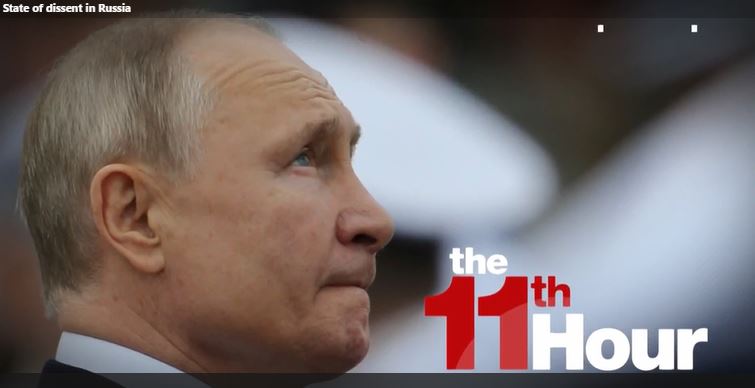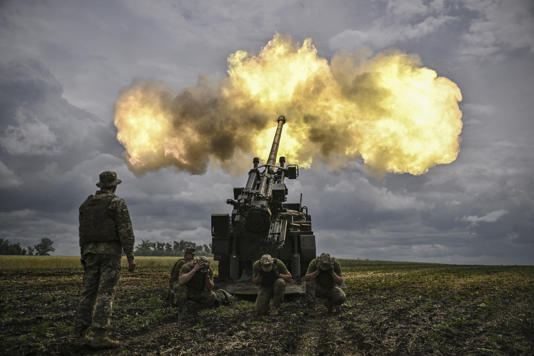

A few weeks ago, euphoria reigned when Ukrainian forces pushed back Russian attempts to seize Kyiv, Kharkiv and Odesa — Ukraine’s three largest cities. Now, pessimism is ascendant. President Volodymyr Zelensky speaks of “very fierce” fighting in eastern Ukraine and high casualties. Ukrainians may be running out of some ammunition.
Since neither side seems ready to quit, fighting will likely continue. But battlefield advantages could continue to ebb and flow, and Ukraine’s fortunes remain uncertain.
Ukraine’s is fighting “for every inch” in Sievierodonetsk and mounting counter-offensives in the southern Kherson region. Ukraine’s army benefits from a general mobilization. The will to fight is strong. Western support for Ukraine exceeds expectations. The West is supplying Ukraine with an ever-larger array of weapons and combat support systems, including artillery and rockets, counter-battery radars and armed drones. Ukraine is making effective use of these arms. But Kyiv seeks more heavy weaponry, especially for counter-offensives.
Ukraine’s main weakness is a firepower gap with Russia’s artillery forces, which helps to enable Russian incremental advances in eastern Ukraine. But Russia’s military suffers from severe deficiencies. Many troops lack the will to fight. Strong Ukraine resistance and other factors prevented a Russian blitzkrieg from succeeding in overthrowing Zelensky.
Russia dispersed its initial invading force on too many axes. Russian forces appear unable to counter Ukrainian aerial drones and Javelin anti-armor and Stinger anti-air weapons. Russian logistics have been vulnerable to interdiction. Some Russian formations have lost discipline and raped and pillaged. Russian troops are stealing and shipping home Ukrainian goods.
Russian forces have reverted to World War II tactics of indiscriminate mass attacks with tube and rocket artillery to grind down Ukrainian defenses. But huge losses have demoralized Russian infantry and weakened armored units. This and the risk of opposition to a military draft may have deterred Russian President Vladimir Putin, in his May 9 Victory Day speech, from calling for large-scale war mobilization. Instead, Russia’s military is struggling to regenerate fighting units that have suffered heavy casualties. Some units are receiving ancient T-62 tanks.
Despite incremental gains in eastern Ukraine, a Russian military collapse is possible. Russian forces could suffer catastrophic defeat akin to that of Egyptian President Gamal Abdel Nasser’s army in the 1967 Six Day War, when more than 80 percent of its military materiel was lost.
Is such a defeat possible? Military history is replete with breakdowns. Last summer, the Afghan armed forces collapsed amid weak governance and extreme corruption. So have other large or well-equipped armies — the demoralized Russian army in 1917; the outmaneuvered French army in 1940 and British army in Singapore in 1942; and the weakened South Vietnamese army in 1975 and Iraqi army in Mosul in 2014.
Central to these fiascos was a lack of cohesion in military institutions, poor governance and corruption, and popular unwillingness to defend the state. Military theorist Carl von Clausewitz’s emphasis on sound relationships between the army, government and society appears valid.
A Russian military collapse might have several implications. First, it might encourage Western countries to boost train-and-equip programs in other countries near Russia. In Ukraine, this effort seems to have helped it adopt more flexible and successful NATO-like tactics. Second, the collapse may cause Western intelligence analysts to reevaluate estimates of the vulnerability of the Baltics and Eastern Europe to Russian aggression. Against a Russian army that may be weaker than once thought, Baltic allies might consider defense options that go beyond tripwire postures. Third, Western militaries may sharply increase their stocks of weapons, which have worked so well in Ukraine – such as portable anti-armor and anti-air – but which have been consumed in larger numbers than expected.
Unlike Nasser, Putin possesses a large and diverse nuclear arsenal that he often touts and has ambiguously threatened to use in the Ukraine war if Russia’s “existential” interests are threatened. But this has not deterred Ukraine or the West from opposing Russia’s invasion.
A Russian military failure in Ukraine might give the West more confidence to challenge aggression elsewhere despite Moscow’s nuclear weaponry. This would not be the first time. The U.S. confronted a nuclear-armed USSR in the 1962 Cuban Missile Crisis and 1973 Yom Kippur War. Russia may understand better than the West that its weak conventional forces might not enable it effectively to exploit any opportunities in Ukraine that a nuclear strike might create.
In conventional or unlikely nuclear escalation scenarios, the West might consider keeping its negotiating powder dry until military and sanctions outcomes come into clearer focus.
Vladimir Putin has issued a thinly-veiled threat to former Soviet Union countries – warning they could share the same fate as Ukraine for defying Russia.
Putin’s words came after Kazakhstan denied the independence of Donetsk and Luhansk
The Russian President made clear he would not hesitate to take the same action against them should they turn against the Kremlin, and would no longer ‘be allies’ with the country.
Mr Putin’s comments followed those of the president of Kazakhstan, who had described the pro-Russian regions of Donetsk and Luhansk in the Donbas as ‘quasi-states territories’.
As Kassym-Jomart Tokayev sat metres away from him at the St Petersburg Economic Forum, he claimed Kazakhstan – which left the USSR in 1991 – was part of ‘historic Russia’.
‘What is the Soviet Union? This is historic Russia,’ Mr Putin said, before praising Kazakhstan as a brotherly nation.
The words were interpreted as a ‘clear threat’, with a Kazakhstan-based expert claiming the Russian president had been humiliated by Mr Tokayev, and so was ‘making him aware that Kazakhstan may be Russia’s next prey’, according to The Telegraph.
Another commented: ‘He’s saying that if you are good neighbours, that’s fine. But if you step out of line and go pro-West, we can conquer your land because it’s ours.’
Equal Justice party urges everyone to encourage Congress to give the Ukrainians long range missiles in order to take the battle to Russia.
Russia and China are enemies of America and must be destroyed before they destroy America according to the Russian Professor Alex Bokev, because Russia and China have plans already on the books to destroy America
Russian Professor Alex Bokev says" it is important that every American be armed to face off against the Russians and Chinese land attack. The purpose of the Second amendment was for America to create the biggest land based army in the world if every Citizen was armed. The second amendment has nothing to do with hunting. Its for National defense. The terrible mass shootings that occur regularly, unfortunately represent collateral damage for having an armed citizenry, which will able to defeat the Russia and Chinese when the land invasion occurs. "


 RSS Feed
RSS Feed
